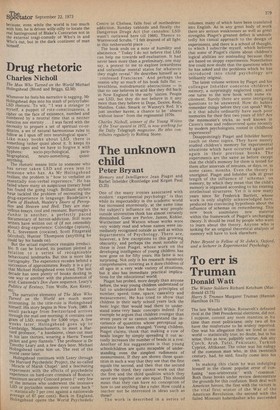The unknown child
Peter Bryant
Memory and Intelligence Jean Piaget and Barbel Inhelder (Routledge and Kegan Paul £5.25)
One of the many ironies associated with modern 'experimental psychology' is that while its respectability in the academic world has increased enormously, at the same time the subject's influence on the way people outside universities think has almost certainly diminished. Gone are Pavlov, James, Kohler, Wertheimer and Watson whose works were very widely read and whose names were immediately recognised outside as well as within departments of Psychology. There are, however, a few exceptions to this growing obscurity, and perhaps the most notable of these is Jean Piaget, whose work on the developing intelligence of young children has now gone on for fifty years. His fame is not surprising. Not only is his reaseach massively comprehensive, covering as it does children of all ages in a very wide variety of situations, but it also has immediate practical implications for the educational world.
Piaget has probed, more deeply than anyone before, the way young children understand or fail to understand the basic principles of number, speed, time, space, casuality and measurement. He has tried to show that children in their early school years lack the basic logic that would lead them to understand some very basic concepts indeed. For example he argues that children younger than seven years or so cannot understand the invariance of quantities whose perceptual appearance has been changed. Young children, Piaget claims, think that making a row of beads longer by simply spreading it out actually increases the number of beads in a row. Another of his suggestions is that young schoolchildren are quite incapable of understanding even the simplest rudiments of measurement. If they are shown three quantities in such a way that they see that the first equals the second, and then that the second equals the third, they cannot work out that the first and the third qualities which they never see together are also equal. This should mean that they can have no conception of how to use anything like a ruler. How could a teacher not be interested in ideas such as these?
The work is described in a series of volumes, many of which have been translated into English. As in any great body of work there are serious weaknesses as well as great strengths. Piaget's greatest defect is undoubtedly his casual approach to the design of experiments, and there is a school of thought, to which I subscribe myself, which believes that some of Piaget's claims about children's logical abilities are misleading because they are based on sloppy experiments. Nonetheless few could now doubt that the questions which he has asked and the problems which he has introduced into child psychology are brilliantly original.
The latest volume written by Piaget and his colleague Inhelder co.ncerns children's memory, a surprisingly neglected topic, and one turns to the new book with some excitement. Surely there are some intriguing questions to be answered. How do babies remember things before they can speak? Why is it that adults ordinarily have such poor memories for their first two years of life? Are the mnemonist's tricks, so well known in Cicero's time and rediscovered quite recently by modern psychologists, rooted in childhood experiences?
Disappointingly Piaget and Inhelder barely touch on these topics. They have merely studied children's memory for experimental situations which have occurred again and again in their previous books. The experiments are the same as before except that the child's memory for them is tested for them after intervals of minutes, or days, or, in some cases, months. Even the theory is unoriginal. Piaget and Inhelder talk at great length of the influence of schemas on memory, by which they mean that the child's memory is organised according to his existing intellectual structures. Yet it is now many years since Sir Frederick Bartlett, whose work is only slightly acknowledged here, produced his convincing hypothesis about the influence of schemas on remembering. This new book assimilates new material within the framework of Piaget's unchanging theory. It should be read by people who want to learn about the theory. Anyone who is looking for an original theoretical analysis of memory will have to look elsewhere.
Peter Bryant is Fellow of St John's, Oxford, and a lecturer in Experimental Psychology.


































 Previous page
Previous page